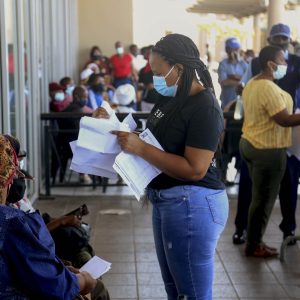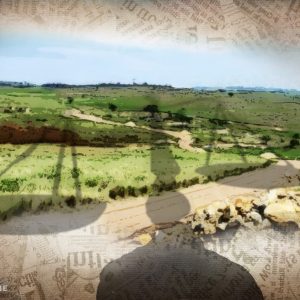Fighting for housing in South Africa
The legacy of murdered Abahlali baseMjondolo interim chair Thuli Ndlovu and activist Mobeni Khwela lives on despite the patronage politics of ANC councillors when it comes to government housing.
Author:
10 February 2021

In September 2006 the municipal publicity magazine in eThekwini municipality carried the profile of an up-and-coming new African National Congress (ANC) councillor Mduduzi Ngcobo. According to the magazine, he had big dreams for the ward he represented: a library, new high schools, a youth programme, upgrading of housing and more. He spoke of his passion for politics and working with ordinary members of the community.
In 2012, accompanied by municipal photographers, he visited the proud owner of a new home, built through a local municipal housing project in his ward. He announced further projects in neighbouring areas.
But only four years later, he and a fellow councillor were imprisoned for life for a callous murder, after a brutal reign of terror and long-standing accusations of corruption in the granting of housing tenders.
Related article:
How could a leader in a one-time liberation movement end up as the deadly enemy of the people, attacking the homeless people’s movement and planning to kill its leaders? The answer is to be found in the changing character of the ANC and the struggle for housing among the millions of homeless families in South Africa.
The issues arose, in part, from the character of the ward Ngcobo represented. Parts of KwaNdengezi were still rural, with people living in informally designated land surrounding their homesteads. As with almost all traditional settlements, each had family burial sites on their land. At meetings to discuss the housing project prior to building, residents had raised concerns with the councillor about the new project being built on top of burial sites.
They wanted a housing project that would improve their lives, not one that would run roughshod over their wishes. Instead their wishes were ignored.
Related article:
After two years of being ignored by the councillor, residents decided to get assistance from the shack dwellers organisation Abahlali baseMjondolo. Many of them joined. The list of grievances had grown as the project progressed, from respect for graves to the critical issue of the allocation of new housing.
This allocation of houses was undertaken without consultation with residents, and houses were being given to people living outside the area. Residents accused the councillor of illegally “selling” houses, despite the government policy that new housing was free. They also accused him of having a corrupt relationship with the housing contractor. What was plain for all to see was that the councillor had suddenly grown rich, driving around his ward in a new black Navara SUV.
In October 2012, the community held a protest, blockading the main road through KwaNdengezi, demanding an answer to their grievances. The police, accompanied by Ngcobo, who was carrying a gun, came to the road block and assaulted the protesters. Thuli Ndlovu, the young woman interim chairperson of Abahlali baseMjondolo in the area, was deliberately singled out for personal intimidation and assault. Ngcobo followed through: that night he arrived at Ndlovu’s home and started shouting threats and shooting a gun outside.
The launch of a local branch of Abahlali was scheduled for a few weeks later. But before the launch meeting could begin, Ngcobo, again carrying a gun, arrived in his Navara and entered the community hall with two local ANC leaders and the municipal community liaison official. He aggressively announced that he was there to talk about crime, and was establishing an official Community Policing Forum.
Gun-toting, aggressive accusations and the backup of the police became his form of rule.
Related article:
Later, when a protest took place in January 2013, Ngcobo again arrived with the police, who arrested four youths that he had pointed out.
After this, things took a turn for the worse. In March, a former resident of KwaNdengezi came looking for Abahlali leaders. He attacked the homes of two leaders. When he didn’t find the person he was looking for in one of the homes, he killed her grandmother and uncle with a bush knife.
Ngcobo’s intimidation and violence continued, yet the community embarked on further protests. Twenty Abahlali members were arrested for public violence but were all eventually released.
Ndlovu’s brave fight against the arrogant and corrupt councillor was brutally ended one night in September 2014. She was home with Siphesihle Madlala, who was there to tutor her child. A gunman entered their home and shot Madlala at close range. Ndlovu ran into the children’s bedroom, where the gunman found her with her one-year-old son, and shot her several times in the chest and abdomen.

Ndlovu had received numerous death threats for her campaign against the councillor. An hour before she was killed, she had told her mother that she had seen Ngcobo driving his well-known black SUV around the area.
A few weeks after Ndlovu’s murder, Mobeni Khwela, an ANC activist who had worked closely with Ndlovu in exposing the Ngcobo’s corruption, was murdered in the same way as Ndlovu.
Such political killings seldom result in arrests. But this time, the justice system took its proper course, and a year later Ngcobo, a fellow ANC councillor and the gunman were arrested for the murder. The other councillor was Velile Lutsheko, who was chairperson of the city’s town planning committee. The trial was held in May 2016. The state’s main evidence was testimony from two accomplices, the hired gunman and a man who was promised a municipal job to point Ndlovu out to the gunman. The judge was satisfied that the two were reliable witnesses. Other important evidence came from cellphone records, which linked the councillors to the gunman.
The councillors were found guilty and sentenced to life imprisonment for murder and conspiracy to commit murder. The gunman was also found guilty and sentenced to life imprisonment for murder, plus 12 years for attempting to murder the tutor Madlala, who survived his wounds.
Related article:
The imprisonment of Ngcobo and his accomplices has brought some peace to the residents of KwaNdengezi. And despite harassment and new killings, Ndlovu’s legacy lives on, as Abahlali continues to gain support among shack dwellers across the country.
Were the political attacks and assassinations of shack dwellers an exception to the ANC’s rule? Unfortunately not. The anti-poor patronage politics of the ANC leads to confrontation with impoverished people struggling for a house. When contracts carry bribes, the houses will be shoddy or incomplete; when houses are allocated, loyal ANC members will be first in line. They will also be expected to be the foot soldiers for the councillor who “gave” them a house.
The democracy we’ve fought for has to be fought for again.
This lightly edited version of an article first published by On the Brink: Analysis and Perspectives for a Socialist World.




